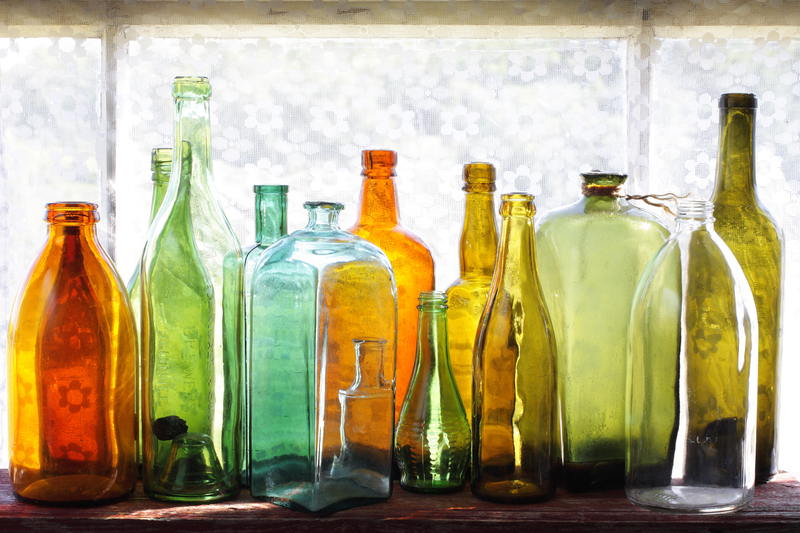Sustainable Solutions for Disposing and Recycling Old Pots and Pans
Are you looking to replace your old cookware but concerned about the environmental impact of simply throwing it away? Disposing of outdated, damaged, or unusable kitchen pots and pans requires much more consideration today as sustainability becomes increasingly important. Whether you have worn-out nonstick pans, rusty cast iron skillets, or mismatched saucepans, this comprehensive article will guide you through sustainable solutions for disposing and recycling old pots and pans. From creative reuse ideas to responsible recycling centers, learn how to give your cookware a second life while contributing positively to our planet.
Why Sustainable Disposal of Old Cookware Matters
Each year, millions of kitchen items are discarded and end up in landfills, causing environmental harm and contributing to resource depletion. Pots and pans, often made from metals like aluminum, stainless steel, or sometimes with ceramic, Teflon, and plastic handles, don't break down easily and can leach chemicals into the environment. By choosing eco-friendly and sustainable ways to dispose of, recycle, or reuse your old cookware, you help:
- Conserve natural resources by enabling metal recovery and reuse
- Reduce landfill waste and associated pollution
- Lower greenhouse gas emissions from manufacturing new products
- Promote a circular economy through responsible consumption
Making conscientious choices for old kitchen pans isn't just good for the planet; it's a way to inspire sustainability in your community and household habits.

Assessing Your Old Cookware: Can It Be Reused, Recycled, or Donated?
Before disposing of old pots and pans, assess their condition. This simple step helps determine the most responsible action: reuse, donation, recycling, or upcycling.
- Usable condition: If your cookware is gently used, free from severe scratches, or with minimal nonstick coating loss, consider donation or resale.
- Damaged or worn-out: Heavily scratched, warped, or coated pans with significant damage are typically unsafe for cooking but may have other uses.
- Broken handles or lids: Cookware missing parts may be best for recycling or upcycling.
_Always check if your cookware contains hazardous materials or coatings (like certain nonstick surfaces with PFOA or PFOS) as they may require specific disposal methods._
Cookware Types and Recycling Challenges
Different sorts of cookware pose different challenges for recycling:
- Stainless steel and iron products are usually the easiest to recycle, as they're made from pure metals or alloys.
- Aluminum pans are recyclable but may feature plastic, rubber, or ceramic handles that must be removed.
- Nonstick cookware is difficult to recycle due to their chemical coatings but increasingly accepted by specialized centers.
- Copper pots and ceramic pans may need professional recycling facilities.
Donation: Giving Old Pots and Pans a New Home
The most sustainable solution for old yet usable pots and pans is passing them on for someone else's use. Donation prevents waste and extends the life of kitchenware. Consider the following options:
Charities and Nonprofits
- Local charity shops (Goodwill, Salvation Army, St. Vincent de Paul) often accept gently used cookware.
- Organizations supporting immigrant families, shelters, or community centers always need kitchen supplies.
- Schools, churches, and youth centers may welcome extra kitchenware for events or classes.
Contact the organization first to confirm they accept pots and pans and inquire about their requirements (some don't take nonstick pans due to health concerns).
Online Platforms and Buy Nothing Groups
Explore options to sell, give away, or trade your pots and pans on digital marketplaces such as:
- Facebook Marketplace
- Craigslist
- Freecycle
- OfferUp
- Buy Nothing Project (local gifting communities)
This not only keeps your old pans out of landfills but also helps others furnish their kitchens affordably.
Creative Reuse and Upcycling Ideas for Old Pots and Pans
If your cookware can't be used for food preparation, consider creative upcycling and repurposing it for other household applications. Here are a few inventive ideas:
Planters and Garden Accessories
- Transform old pots and pans into unique garden planters. Drill drainage holes, fill with soil, and plant flowers, herbs, or succulents.
- Use larger pots as tiny herb gardens on balconies or windowsills.
- Pans make quirky birdbaths, hanging baskets, or decorative garden art.
Tip: Give pans a fresh coat of non-toxic paint to match your decor!
Household Organizers and Storage Solutions
- Old pots make excellent storage bins for craft supplies, toys, or tools.
- Shallow pans become desk organizers for paperclips, pens, or hardware.
- Screw old handles or lids onto walls for DIY hooks and racks.
DIY Home Decor Projects
- Turn lids into framed mirrors, chalkboards, or wall clocks.
- Nonstick frying pans become retro wall art with a little creativity and some paint.
- Arrange several old pots for a whimsical kitchen sculpture or mobile.
By reimagining your old cookware, you avoid waste and add a personal touch to your home or garden.
Responsible Recycling: How to Recycle Old Pots and Pans
If your old pots and pans are beyond repair or creative reuse, recycling is the next sustainable option. However, recycling methods depend on materials and local regulations.
Prepare Your Cookware for Recycling
- Remove all non-metal components such as plastic, rubber, wooden handles, or glass lids.
- Separate different materials if possible (e.g., remove steel screws from aluminum bodies).
- Clean thoroughly to remove food residue or grease, as dirty items may not be accepted.
Find the Right Recycling Facility
Most municipalities do not accept cookware in curbside recycling because their facilities aren't equipped to handle cookware's shape and material blends. Instead, look for:
- Scrap metal yards: These facilities accept most metal pots and pans, including copper, aluminum, cast iron, and stainless steel. Some pay by weight for pure metals.
- Specialty recycling centers: Some cities have programs or drop-off centers that accept cookware, including those with nonstick coatings.
- Household hazardous waste events: For pans with chemical coatings, check if your municipality hosts events for "special waste" disposal.
- Manufacturer take-back programs: A few brands offer recycling or trade-in services (see below).
Tip: Use search terms like "recycle old frying pans near me" or "scrap metal recycling cookware" to find nearby facilities.
Brand Take-Back and Recycling Programs
Growing awareness of sustainable cookware disposal has encouraged some makers to establish return and recycling initiatives:
- TerraCycle: Offers zero-waste boxes for all brands of metal cookware (fees apply).
- GreenPan: Accepts old GreenPan cookware for responsible recycling through its Take Back Program.
- Calphalon: Provides a recycling program for its customers within the United States.
Check the manufacturer's website or customer service line for up-to-date information on such programs.
Proper Disposal of Non-Recyclable Cookware
Some cookware materials, notably pans with PFOA-based nonstick coatings and ceramic pans with cracks, are not accepted by recycling centers or hazardous waste programs. In these situations:
- Wrap and place items in regular household waste as a last resort.
- Label hazardous materials where relevant for curbside pickup.
- Always try donation, upcycling, or manufacturer take-back programs before defaulting to the landfill.
Reminder: Never burn cookware (especially nonstick types), as toxic fumes may be released.
Sustainable Shopping: Preventing Cookware Waste in the Future
The most effective way to minimize the environmental footprint from pots and pans is to think sustainably before you buy.
Choose Durable, Recyclable, and Repairable Cookware
- Invest in high-quality stainless steel, cast iron, or carbon steel cookware for longevity and easy recyclability.
- Prefer uncoated pans that won't leach chemicals or require special disposal.
- Look for brands with repair services, spare parts, or lifetime warranties.
Maintain Your Pots and Pans Properly
- Use gentle cleaning tools to avoid scratching coatings.
- Season cast iron and carbon steel pans regularly to extend their life.
- Follow manufacturer instructions for care and storage.
When you invest in long-lasting kitchen equipment and care for it well, you won't need to dispose of it frequently--thus reducing future waste.

Frequently Asked Questions about Recycling Old Pots and Pans
Can I put old pots and pans in my curbside recycling bin?
No. Most curbside recycling services do not accept metal cookware, due to their size, shape, and mixed materials. Use metal recycling centers or scrap yards instead.
What do I do with nonstick pans that have lost their coating?
If the pan is heavily scratched, it's best to discontinue cooking use. Some specialized centers or TerraCycle accept nonstick cookware; otherwise, remove plastic/extraneous materials and drop the rest at a scrap metal facility.
Can glass lids be recycled with cookware?
Tempered glass lids cannot be recycled in regular glass recycling streams. Remove and dispose of separately or check for local special glass recycling options.
Is it safe to use old or rusty pots and pans for upcycling projects?
Yes! Even rusty or cracked pans can be repurposed safely for non-food uses, such as planters, art, or storage.
Conclusion: Choose Sustainability When Replacing Cookware
Disposing of old pots and pans does not mean contributing to mounting landfill waste. By donating usable cookware, upcycling for creative uses, or recycling metals and materials responsibly, you play a crucial part in closing the loop of kitchenware consumption. Remember, every sustainable action matters--especially when replacing everyday essentials like cookware.
Next time you swap out a saucepan or skillet, consider these sustainable solutions for disposing and recycling old pots and pans. You'll protect the environment, inspire others, and maybe discover a new hobby through upcycling!
Together, let's make our kitchens--and our planet--a little greener, one pan at a time.
```